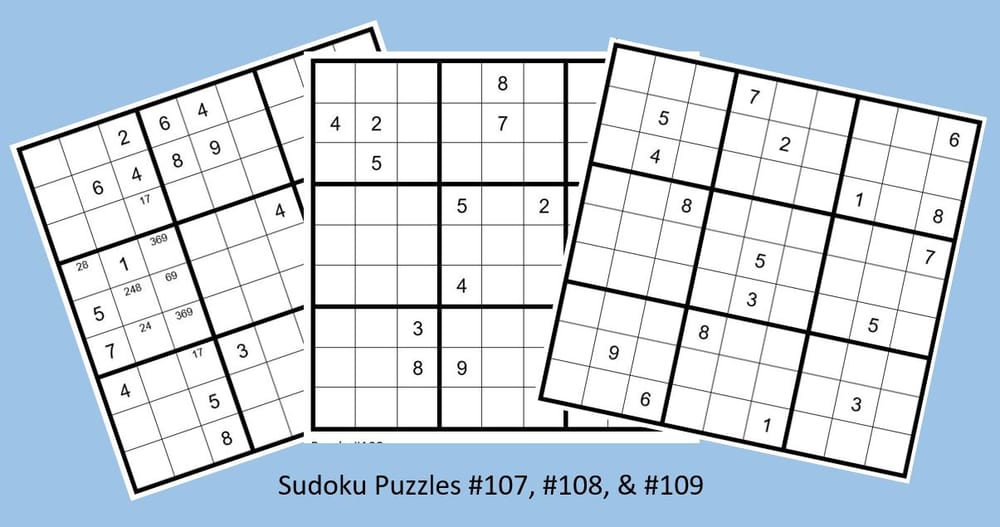Sudoku Puzzles #107, #108, & #109
by: Dan LeKander
We will continue with the 3 puzzles each month. That should be ample material for novices or seasoned veterans. I hope you enjoy this change.
Clueless?
We start with a Sudoku puzzle in progress, where it appears there are no more obvious or not-so-obvious clues. Can you find the hidden clue in Puzzle #107? Warning … this is not an easy clue to find!

(The answer follows after the conclusion of Puzzle #109, the feature puzzle for May)
Logic Puzzle. Difficult rating … 6/10
Puzzle #108 does not require advanced techniques 6-8. You are on your own. Please enjoy.

Feature Puzzle. Difficult rating … 6/10
Print this puzzle and give it a go.

Dan recommends the following Steps to complete the puzzle.
Step 1: Sudoku Pairs, Triplets and Quads – See September 2015
Step 2: Turbos & Interaction – See October 2015
Step 3: Sudoku Gordonian Rectangles and Polygons – See November 2015
Step 4: XY-Wings & XYZ Wings – See December 2015
Step 5: X-Wings – See January 2016
Step 6: DAN’S YES/NO CHALLENGE
Step 7: DAN’S CLOSE RELATIONSHIP CHALLENGE
Step 8: AN EXPANSION OF STEP 7Steps 1-5 are relatively common techniques and are explained in the TI LIFE articles above. Steps 6-8 are covered in detail, in Dan’s book.

PUZZLE PREPARATION
Prior to utilizing Steps 1-8, complete the 5 Steps of Puzzle Preparation …
- FILL IN DATA FROM OBSERVATIONS
- FILL IN OBVIOUS ANSWERS
- FILL IN NOT-SO-OBVIOUS ANSWERS
- MARK UNSOLVED CELLS WITH OPTIONS THAT CANNOT EXIST IN THOSE CELLS
- FILL IN THE OPTIONS FOR THE UNSOLVED CELLS
You should be able to solve this puzzle to point of Example #109.1 below without the use of advanced techniques:

At this point there might exist some missed clues. Regardless, this is the perfect fit for a Step 7 exercise. We have plenty of unsolved cells with two-digit options to choose for our starter cell.
We will now proceed to Step 7, Dan’s Close Relationship Challenge. We will pick C9R7 as our starter cell, with a sequence of 9,2. We will annotate this on the 2nd level of this cell, as per Ex-ample #109.2 below.

We begin by asking ourselves that if this starter cell is a 9, what adjacent cells could not be a 9, annotating those cells as “N9”, again on the 2nd level of those cells. This just simply means that if the starter cell is a 9, then those cells cannot be a 9.
Next, we assume the starter cell is a 2 and track the results through the puzzle. If any N9 cell is a number other than 9, it means that cell is not a 9 regardless if the starter cell is a 9 or 2, and the 9 could be eliminated as an option from that cell.
Before we perform this exercise, we will list the potential outcomes . . .
• The tracking of the second number of the starter cell doesn’t reach the N9 cells, and there-fore, the exercise is unsuccessful.
• The tracking of the second number goes entirely through the puzzle without a conflict, indicating that the 2nd number is correct for the starter cell and you have solved the puzzle.
• The tracking of the second number creates a conflict, such as a number showing up twice in a row, column or box. Or it could show up by having no cell for a particular number in a row, column or box. Regardless of how the conflict arises, it would mean the second number is incorrect for that cell, and therefore, the answer to the starter cell is the first number.
We will now track the 2 through the puzzle above on the third level of the unsolved cells to pre-serve the integrity of the original puzzle. If C9R7=2, then C2R7=3, C6R7=9, C6R4=2 & C2R4=3. We already spot a conflict in column 2. We cannot have two 3’s in a column. This indicates that the starter cell, C9R7, cannot be a 2 and is therefore, a 9.
The puzzle is easily solved from this point and the solution is Example #109.3 below:

May the gentle winds of Sudoku be at your back.
By Dan LeKander
Clue for Puzzle #107 … did you find the clue? If not, read on.
Take a look at row 2. What do you see?
We see that C1R2 cannot be a 7. It therefore follows that a 7 must be an answer in C7R2, C8R2 or C9R2. Given this fact, C7R1, C8R1 & C9R1 cannot have a 7 as an option. This leaves C2R1 as the only unsolved cell in row 1 that can be a 7. C2R1=7. Then C3R3=1 and so on.
Editor's Note: May 2022 - into the 100s
Somehow designing Puzzles #107 - #109 on paper is a wonderful feat on its own - giving it to our readers to solve is a great pleasure. Each month I write:
"When we published the final article in Dan's Series of steps to learn the logic of Sudoku, I never in a zillion years thought that Dan would so graciously offer to do one or two puzzles for us each month - and he has done so without my asking."
Then his wife, Peggy, does the proof reading and I only have to post in on TI Life. We would love to know how many you have solved. (Some, darn it, have stumped me, but I look forward to them each month.)
And, if you have not already done so, I suggest you purchase Dan’s book:

